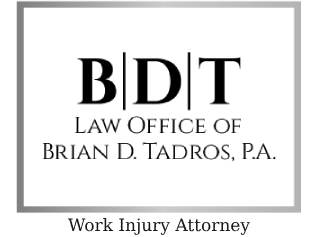Page Topline
About
What You
Are Entitled To
First and foremost, if you are injured on the job, you are entitled to be treated fairly. Nobody sets out to get hurt or to have an accident. Florida Statutes Section 440.02 (1), Florida Statutes (2018) defines an accident as “an unexpected or unusual event or result that happens suddenly.” After suffering an accident at work, you may not only be in pain, but also concerned about what medical treatment you are going to get and whether you will get paid for any time missed from work.
If injured, you will get medical treatment for injuries that are deemed to be related to the industrial accident by greater than 50%. However, there must be a medical opinion recommending that treatment and providing that opinion, based on the cause of the accident.
Additionally, you are entitled to receive indemnity (lost wages) under certain circumstances. Taking, for instance, an example of a fall from a significant height at work, sustaining multiple injuries; you would likely be placed on a no work status initially when seen by an authorized treating physician. In this example, the initial authorized treating physician is likely to be a hospital. When there is an admissible medical opinion indicating that a worker is unable to work because of an industrial accident, that worker is entitled to be paid temporary total disability benefits (TTD). Following the same example, if you receive treatment and show signs of improvement, at some point, you are likely to be placed on light duty work restrictions.
More About
Recovery
And Your Benefits
For instance, if you’ve improved to the point where you can stand and walk, but no more than 2 hours per day and can lift no more than 10 pounds per day, there are some questions that must be answered. (1) Are you still an employee of the insured Employer? (2) Does your Employer have light duty work available for you to perform that is within the light duty restrictions assigned by your authorized treating physician? (3) Did your insured Employer make you aware of the light duty work that is available? (4) Did the claimant return to work and perform the work made available? (5) If you did return to work, how much did you earn in wages? Without getting into the mathematics of it all, depending on the answers to those questions, you may be entitled to temporary partial disability benefit (TPD).
Once you’ve reached a point where there is no further recovery or improvement from the injury or disease in question, you may be placed on what is called maximum medical improvement (MMI). Once MMI has been established, you are no longer entitled to receive TTD or TPD. However, when MMI is established, you may be assigned a permanent impairment rating (PIR). The PIR is the percentage of your body as a whole that is permanently partially impaired and is shown as a percentage (for example, you may be told you have 4% permanent impairment rating). Depending on the percentage assigned, impairment income benefits (IIBs) may be owed to you.
In the rare instance that you are unable to return to at least some, seated employment within a 50 mile radius of your home, permanent total disability benefits (PTD) may be owed. These lost wages are paid out at the same rate of TTD, but would continue until you reach 75 years of age, under most circumstances. In addition, if entitled to PTD benefits, you would also be entitled to what is known as PTD supplemental benefits, which essentially provide an increase to cover the cost of living increase from year to year.
Page Copyright
© Copyright BDT Law Firm. All Rights Reserved - Privacy Policy - Powered By Clarity Creative
